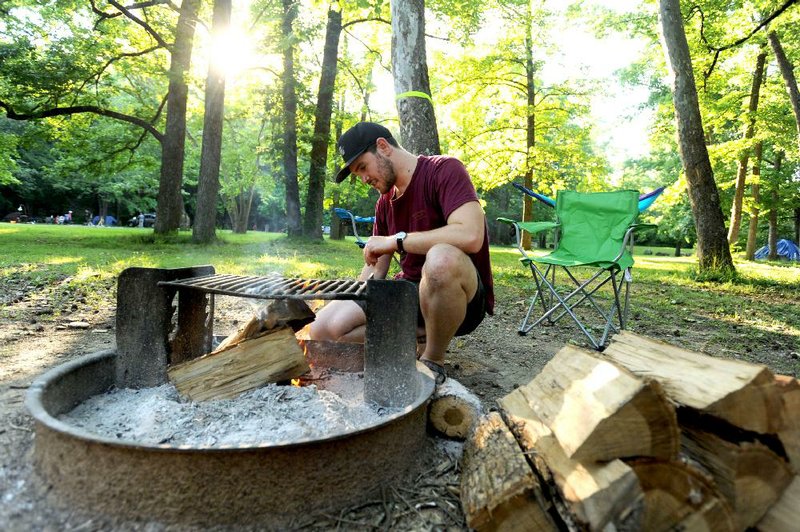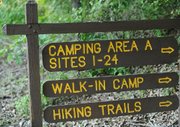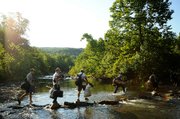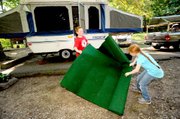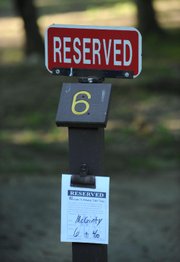Editor's note: Camping season is here, which means young families and plucky older individuals are embarking on their first camping adventures. This list of tips for novices has been compiled over several years by gathering advice from readers and veteran campers.
What would you add to it?
Happy camping.
• Don't assume the campground will be open because it used to be open years ago.
• Research the park before you go. Learn if there are parking as well as camping fees, and always read any "special notices" posted on a park's website.
• Camp during the week if possible. Campgrounds are almost always crowded on the weekend.
• Don't expect Wi-Fi.
• If you use an inflatable sleeping pad or mattress, have a patch kit for it. Kits go for about $10, but you'd give $100 when you need one.
• Use a tent's ground cloth properly. Make sure it's not sticking out past your tent's floor footprint. Otherwise you have created a bowl to collect rainwater under your tent. Not good.
• Always use the tent's rain fly. Arkansas humidity ensures that, sometime between 2 and 4 a.m., so much dew will form that anything you haven't covered will wind up as wet as if it was rained upon.
• If you use a battery-operated pump to inflate an air mattress, flip one of the batteries upside down so the pump doesn't accidentally come on and drain the batteries.
• Keep duct tape and parachute cord in your camp kit. Both have many uses in camp.
• Assemble a basic first-aid kit and inspect it each year. A small sewing kit is also handy to have.
• Most campgrounds don't have receptacles for recycling. Be prepared to take your recyclables home.
• Whoever usually plans the meals and cooks at home should get a break when camping.
• Don't take a radio or CD player into the woods. No one wants to hear your personal preference of amplified noise.
• Pack similar items together in zipper bags. Squeezing the air out of the bags saves space.
• Don't feel like you need a scheduled activity to fill every minute. Relax and enjoy.
• It's better to have it and not need it than not have it, so pack on the heavy side. You aren't backpacking. You won't have to carry it.
• Pack only a few changes of clothes. You end up wearing the same clothes several days at a time. If they smell like campfire smoke, so much the better.
• Keep a pair of channel-lock pliers among your kitchen gear. They're great for lifting hot pots off the campfire.
• Take a shovel. It's useful for spreading hot coals beneath a cooking grate.
• Take leather gloves. Yes, that coffee pot or skillet on the campfire really will be hot.
• Plastic jars with tight lids are ideal waterproof containers for canoe camping -- don't take glass.
• Take two lighters. One to use and one to lose.
• Hats and sunglasses are essential gear because you'll be outside all day.
• Leave the contact lenses at home and wear your spectacles instead. Campfire smoke plays havoc with contacts, and it's not easy to maintain the highest standard of hygiene in camp.
• Pack sunscreen, insect repellent, hand lotion and lip balm in your kit.
• Include witch hazel or rubbing alcohol prep pads in your first-aid kit and carry one or two when you go hiking. Should you brush up against poison ivy, wipe off your skin.
• Soy milk keeps much longer in a cooler than dairy milk. It can be used as dairy milk in any recipe.
• Don't scatter your ice in the cooler. Separate the ice into two to four zipper bags. The ice will last longer and items in the cooler won't get wet.
• Rinse plastic milk jugs, fill them three-fourths full of water and freeze them. Use these instead of bagged ice in your cooler. The ice inside becomes ice-cold drinking water as it melts.
• Put coolers and trash inside your car before going to bed.
Critters can't bother them there.
• Store your camping gear in a little-used room at home, like a formal dining room or spare bedroom, preferably close to a door. It will make packing and unpacking easier.
• Many campsites do not include a permanent table. A portable table comes in handy for preparing meals.
• Pack proper shoes for hiking, but take a cozy pair for slopping around camp.
CAMPING WITH CHILDREN
• Before taking kids on their first camping trip, schedule a night or two sleeping in the backyard. This will help children gain confidence in the tent, sleeping bags and sleeping outdoors. And it will give you a chance to make sure you have all the tent stakes and gear you need.
• Teach children to recognize poison ivy and poison oak. ("Leaves of three, let it be.") Expect this to take several sessions.
• When camping with kids, it's important to leave your campsite cleaner than you found it. When a child sees a parent picking up trash someone else has left, it teaches a lasting lesson about taking care of the environment.
• Involve the kids in planning and preparing. They can learn important life skills when studying maps, preparing food and selecting their own clothing to take.
• Taking young children camping can be a challenge at times, but there will be a big payoff later. As they get older and learn to appreciate the natural wonders, they're more likely to become good stewards of the environment. Get kids outdoors.
• Take cards, board games or (gasp!) computer games to keep kids occupied if it rains.
• With children sitting around the campfire, let it die down gradually as bedtime nears. The dying light becomes a subliminal signal for them to get sleepy. This works best if you don't pump them full of 15 high-sugar s'mores and three caffeine energy drinks.
• A campsite near water is great for kids. They can keep themselves amused for hours along a creek bank or lake shore, and it allows you to teach them about the small ways people can work to keep water clean, for instance, by keeping human waste out of the water.
MORE CAMPSITE TIPS
• Sleep with the same number of pillows when you camp as you use at home.
• Make meal components ahead of time and freeze. They help cool the ice chest and also last longer.
• Apply your bug spray when you're outside the tent, not inside where it will stink up the place.
• Cut rebar into 16-inch lengths or longer to make industrial-strength tent stakes. Make a bend at the top of each stake so it has an L or J shape. They aren't light but they sure hold on blustery days.
• Schedule your first camping trip or two with experienced campers. You'll learn from them and see what gear they use and what you'll need to camp on your own.
• Take some nature walks alone. Hiking into the forest and experiencing the sights and sounds without a crowd of people around is an experience that will astound and restore your spirits.
• Tacos are an easy camp dinner because they don't involve forks and spoons. Cook chicken or beef and chop vegetables at home. Store in zipper bags for easy assembly at camp.
• Keep the tent flaps zipped when you aren't inside, even when you are nearby. Insects and snakes don't know how to work a zipper.
• Always pack rain gear, even when rain isn't expected.
• Save lint from your clothes dryer. It makes a great fire starter.
ActiveStyle on 06/20/2016
